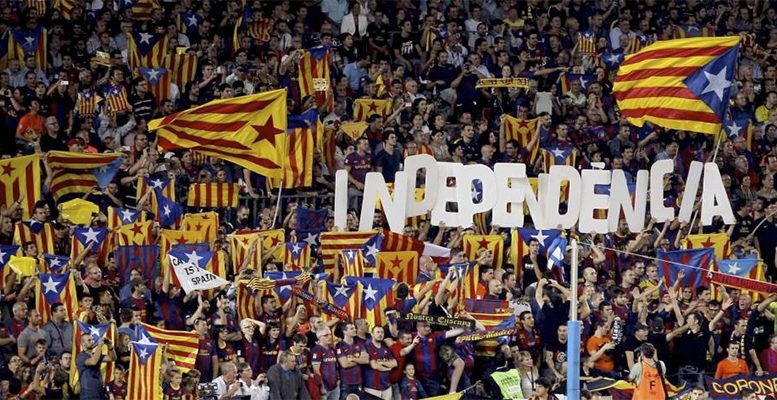Another solemn announcement by the Catalan government, another date for the diary. On October 1, the Catalan people will be asked to vote ‘yes’ or ‘no’ on the following question: “Do you want Catalonia to be an independent state in the form of a republic?” The Catalan separatist camp, led by regional premier Carles Puigdemont, hopes for a victory that will then see the north-eastern region declare independence from Spain.
But, with the central government of Mariano Rajoy promising to block the referendum, even Puigdemont knows it’s not as simple as that.
His unveiling of the date and question of the planned referendum on June 9 was widely anticipated. But it has not cleared the uncertainty hanging over Catalonia or slackened the tension that has been building between Barcelona and Madrid.
That tension is generated by two opposing views of Spain’s territorial crisis. For Catalan nationalists, this referendum is the most basic of democratic rights, a chance to express their political will in a peaceful manner. At a pro-referendum rally in Barcelona on Sunday the independence camp’s biggest celebrity, Pep Guardiola, called on democrats around the world to defend “the rights under threat today in Catalonia such as freedom and political expression and the right to vote, to face up to the abuses of an authoritarian state.”
Yet for many others across the country, it is an illegal challenge to the Spanish constitution – an attempt to play the victim by a region that has more autonomy than any other in Spain (except the Basque Country and Navarra) and more than many regions across Europe.
This stand-off has been rumbling on in one form or another since 2012, when the Catalan independence movement entered the political mainstream following Rajoy’s refusal to discuss devolving more financial powers to the region. But Puigdemont’s October 1 date now appears to lay down a day of reckoning.
There is a range of potential outcomes to all this. Probably the least likely is that the referendum goes ahead entirely as planned, with Rajoy doing only the minimum to thwart it.
The other extreme would be that Madrid goes all out to stop the vote, using Spain’s chronically politicised courts and possibly even triggering article 155 of the constitution, the “nuclear option”, which allows the central government to retrieve certain powers devolved to regional administrations.
But something less decisive and more in tune with the character of the Spanish prime minister may take place: for example, a symbolic, defiant vote on October 1, but one that is severely hobbled by legal action from Madrid; or, an early, air-clearing Catalan election that would weaken Puigdemont’s PDeCAT party, strengthen the more stridently secessionist Catalan Republican Left (ERC), but send the independence camp back to the drawing board.
The biggest variable in all of this will be how far the Rajoy government is willing to go in order to prevent the referendum from happening. Three years ago, he allowed an informal, non-binding referendum in Catalonia which he also deemed illegal to go ahead, fearing international outcry if he was more heavy-handed. But despite Rajoy’s almost pathological reluctance to be decisive, there is a feeling that this time round he could take more drastic measures. He may have lost his parliamentary majority and be plagued by corruption cases, but in the turmoil of the Trump/Brexit era, many of his EU colleagues regard him as southern Europe’s safe pair of hands, a leader who deserves their support.
Large doses of dogma and misinformation on both sides have led to Spain’s territorial crisis. Resolving it may turn out to be beyond the powers of those currently involved in this weird waltz.





